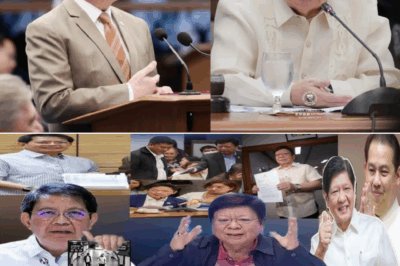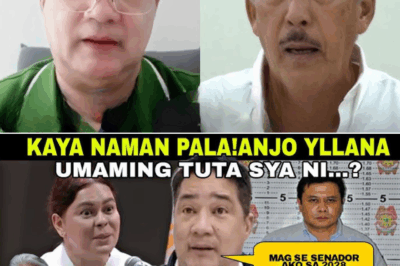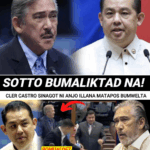The political scene in the Philippines has once again erupted into chaos—this time, a combination of explosive corruption allegations, emotional appeals for accountability, and a brewing personal controversy involving well-known public figures. At the center of it all: a Senate investigation into alleged flood control anomalies, an invitation to a powerful political ally, and a series of online revelations threatening to expose more than just government irregularities.

Senate President Vicente “Tito” Sotto confirmed that the upper chamber is now preparing to formally invite former House Speaker and current Leyte First District Representative Martin Romualdez to appear before the Senate Blue Ribbon Committee. The move follows growing calls from lawmakers and advocacy groups demanding full transparency in the probe into billions of pesos allegedly lost to questionable flood control projects.
Sotto said that the invitation aims to clarify Romualdez’s possible connection to the ongoing corruption investigation, which has so far implicated several former and sitting lawmakers. “We’re thinking of extending a direct invitation,” Sotto told reporters. “It might be better if we personally invite him rather than going through the House Speaker’s office. We just want the truth to come out.”
This decision comes as pressure mounts from both the public and watchdog organizations to hold those responsible accountable. The group Tindig Pilipinas has urged the Office of the Ombudsman to expedite the filing of plunder charges against government officials allegedly involved in massive fund mismanagement. According to the group, the scale of corruption uncovered so far “clearly reaches plunder levels,” citing billions of pesos allegedly siphoned from infrastructure and flood control projects.
“Before the year ends, we want to see real accountability,” the group’s spokesperson declared. “We’ve seen enough delays. It’s time that those who stole from the public coffers face the consequences.”
The scandal has taken on a new level of intensity after the 2025 World Risk Index ranked the Philippines among the most vulnerable nations to natural disasters—third globally due to its fragmented geography, poor drainage systems, and weak infrastructure planning. Critics argue that corruption in flood control projects has only worsened the country’s susceptibility to typhoons and severe flooding, putting millions of lives at risk.
“Every peso stolen from those projects translates to flooded homes, destroyed livelihoods, and lost lives,” said one environmental advocate. “This is no longer just a corruption issue—it’s a national survival issue.”
In response, President Ferdinand “Bongbong” Marcos Jr. has directed all relevant agencies to intensify relief operations following the recent devastation caused by Typhoon Tino, which battered parts of Visayas and Mindanao. The Department of Social Welfare and Development (DSWD) reported distributing over ₱9.4 million in humanitarian aid and more than 123,000 family food packs. Marcos emphasized that the government remains on full alert for future storms, assuring the public that ₱2.87 billion in standby funds are ready for rapid deployment.
“We want to ensure that no Filipino is left behind in times of disaster,” the President said. “The people deserve not only immediate help but also long-term solutions.”
However, not everyone is convinced that the government’s response addresses the root of the problem. Opposition figures and civic groups argue that unless corruption in infrastructure spending is eradicated, every disaster will continue to reveal the same cracks in the system—both literally and politically.
Adding fuel to the fire, former Bicol Partylist Representative Zaldico, one of the key figures linked to the alleged flood control irregularities, has refused to return to the Philippines, citing “serious threats” to his life. His legal counsel, Atty. Huroy Rondain, explained that his client is “deathly afraid” to come home, given the overwhelming public anger against him.

“One half of the country wants him jailed, and the other half wants him hanged,” Rondain said. “Under those circumstances, would you really advise him to return?”
But for many Filipinos, this explanation only strengthened the belief that Zaldico is hiding from accountability. Social media users were quick to dismiss his claims of fear, arguing that “no one afraid of justice is truly innocent.” One viral comment read: “If you’re clean, you come home and face the law. If you’re guilty, you hide behind excuses.”
While the corruption scandal continues to dominate headlines, another controversy has unexpectedly drawn the attention of the nation—this time involving Senate President Tito Sotto himself. A heated online exchange between Sotto and television personality Anjo sparked widespread speculation after Anjo publicly threatened to expose an alleged affair dating back to 2013.
During a live broadcast, Anjo boldly challenged Sotto, saying, “Do you really want me to reveal who your mistress was in 2013—the one you asked me to keep quiet about?” The statement quickly went viral, igniting a social media frenzy. Within hours, thousands of users began guessing names, sharing throwback photos, and posting old entertainment clips, while others called for restraint, saying that “personal matters should not overshadow national issues.”
Malacañang has since stepped in to downplay the situation, calling it a “non-issue” and emphasizing that the government remains focused on responding to national crises. However, critics argue that such personal scandals further erode public trust in leadership, especially when intertwined with larger issues of corruption and accountability.
“This is the unfortunate state of our politics,” one analyst noted. “When personal conflicts, corruption scandals, and disaster response all collide in one news cycle, it shows how deeply interconnected our governance failures have become.”
As public frustration builds, the call for reform grows louder. Lawmakers, activists, and citizens alike are demanding not just investigations but actual results—indictments, convictions, and a transparent system that ensures funds reach their intended purpose.
Senate insiders hint that the next Blue Ribbon Committee hearing may become one of the most highly anticipated in years, as Romualdez’s response—or absence—could shape the direction of the entire probe. Meanwhile, civic groups vow to continue pressuring the Ombudsman to act decisively against those implicated.
For now, the flood control controversy stands as both a literal and figurative storm for the nation. Between the billions allegedly lost, the lives affected by disasters, and the political drama unraveling in public view, Filipinos are left wondering: who will finally take responsibility, and when will the truth finally surface?
News
Senator Ping Lacson Drops Bombshell: Exposes CCTV Evidence and Major Flood Control Scandal Tied to Lawmakers
The halls of the Senate erupted with tension this week as Senator Ping Lacson took center stage, unveiling what he…
Anjo Yllana Faces Possible Cyber Libel Case After Explosive Accusations Against Tito and Vic Sotto
What started as a string of emotional online rants may now lead to a serious legal battle. Former Eat Bulaga!…
Anjo Yllana’s Explosive Tirades Against Tito Sotto: What Really Drove the Former “Eat Bulaga” Host to Turn Against His Longtime Friend
For two decades, Anjo Yllana was a familiar face in Filipino homes—a comedian, actor, and beloved host on the legendary…
Ria Atayde at Zanjoe Marudo, Tuluyang Naghiwalay Matapos ang Matagal na Pagsubok sa Kanilang Relasyon
Isang Nakakalungkot na Balita sa Mundo ng ShowbizIsang matinding balita ang kumalat kamakailan sa industriya ng showbiz—ang relasyon nina Ria…
Daniel Padilla at Kyla Estrada, Spotted Magkasama sa Publiko — Netizens Kinilig, Katniel Fans Nagulat sa Hard Launch ng Bagong Relasyon
Sa gitna ng Halloween season, tila hindi takot kundi kilig ang hatid ng pinakabagong usap-usapan sa showbiz—ang rumored couple na…
Misteryong Hindi Malutas: Ang Pagdukot sa Anim na Magkakaibigan sa Batangas na Hanggang Ngayon ay Walang Hustisya
Isang bakasyon na dapat ay puno ng saya at tawanan ang nauwi sa trahedya at misteryo. Apat na taon na…
End of content
No more pages to load












